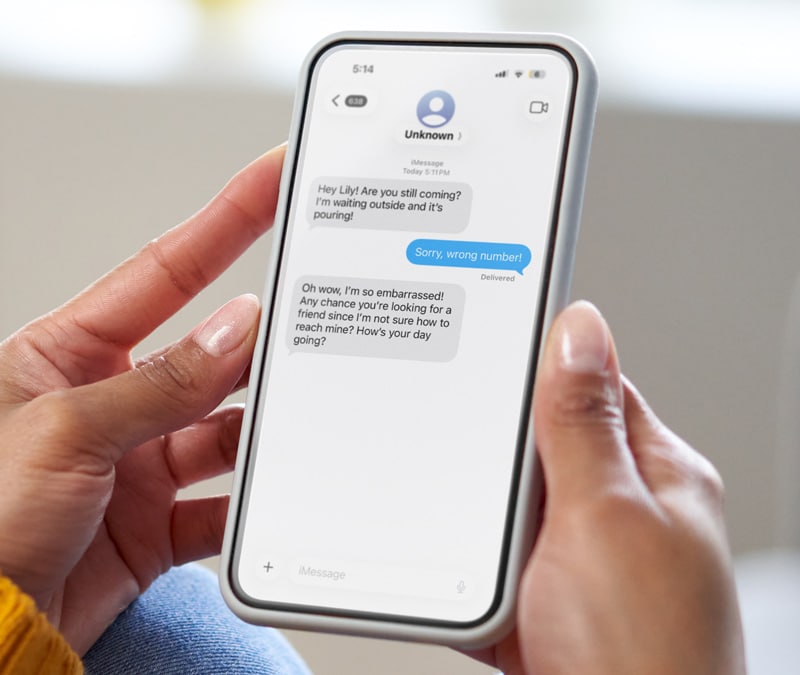Are younger generations more susceptible to online scams?
Growing up in a tech-centric world has its drawbacks, and Gen Z is more exposed to cyber threats than ever before.

In the vast landscape of the internet, where cat videos coexist with cutting-edge technology, Gen Z has found a home. Born into a world where smartphones are nearly an extension of limbs, this young generation sets the stage for the future. However, as they navigate the digital Wild West, they are finding themselves increasingly at the crossroads of convenience and shifty scams.
The place where Gen Z thrives
Before we delve into the darker side of the digital realm, let's appreciate the digital playgrounds where Gen Z spends their time. Social media platforms, instant messaging apps, gaming sites, and online communities are their domains. According to a 2022 Pew Research Center survey, 95% of Gen Z individuals in the U.S. have access to a smartphone, and just as many are on some form (or many forms) of social media. Their fluency in technology is remarkable, but it also makes them more vulnerable to online scams.
Taking the bait: Phishing scams on the rise
The statistics are clear: scams are proliferating, and Gen Z is becoming a prime target. In 2022, scammers made $210 million off people under 20. That's up from $8 million in 2017. Gen Z, with an innate trust in digital interactions, is especially exposed.
One of the most prevalent issues targeting Gen Z is phishing. Scammers are becoming increasingly sophisticated, mimicking familiar platforms to trick users into divulging sensitive information. In 2022, the Annual Cybersecurity Attitudes and Behaviors Report shared that 34% of Gen Z lost data or money due to phishing, compared to older generations (i.e., Millennials, Gen X, Baby Boomers, and Silent Gen) who were about three times less likely to have been victims of phishing.
The best defense: Knowledge and awareness. Stay informed about the latest scams and phishing techniques. Online resources, such as the FTC and cybersecurity blogs like our Norton Blog, provide valuable information to help you stay one step ahead. Also, share experiences with friends, family, and online communities. The more we openly discuss scams, the less power scammers have. Awareness is a collective effort.
Trust issues: Falling for fraud
Growing up in an era where connectivity is king, Gen Z inherently trusts the online world. They are accustomed to sharing their lives on social media, engaging with influencers, and taking part in online communities. This trust, while admirable, may be exploited by scammers.
Consider the rise of fake influencers and fraudulent online marketplaces. According to a recent study from Deloitte, Gen Z are three times as likely as Boomers to fall for an online scam (16% vs. 5%) and are twice as likely as Boomers to get hacked on social media (17% vs. 8%). Scammers create counterfeit social media profiles, promising exclusive content or unbeatable deals. Eager to be part of the latest trends, Gen Z often falls prey to these deceptive schemes.
The best defense: Verify everything; don't trust blindly. Before clicking on an enticing link or responding to a message, confirm the source. Legitimate businesses and influencers have verified accounts, and a quick check can save you from falling into a scammer's trap. Additionally, you can always use Norton Genie, an industry leading AI-powered scam detection tool that can spot scams in seconds.
FOMO: Preying on exclusivity and urgency
Fear of Missing Out (FOMO) is a powerful force, and scammers know it.
The Federal Trade Commission (FTC) Consumer Sentinel Network reported an expected $380 million loss when it came to online shopping, with those 18-24 years old at the highest risk. Gen Z, with its penchant for online shopping, is a prime target. The urgency created by limited time offers or exclusive discounts can cloud judgment, leading to impulsive decisions and financial losses.
The best defense: Ask yourself an age-old question, “is it too good to be true?” If so, it probably is. While a dream prom dress for $25 if you “buy now” might be real, you should do some serious investigating before entering any credit card information to keep yourself safe. Scammers thrive on exploiting excitement and urgency. Take a step back, assess the situation, and question anything that feels out of the ordinary.
The catch-22 of convenience: Mobile banking scams
Gen Z's reliance on mobile banking apps is a convenience that scammers exploit. The latest Chase Digital Banking Attitudes Study has found that that 99% of Gen Z use a mobile banking app, and for a wide range of tasks, including viewing account balances, checking their credit scores, and depositing checks.
This shift towards digital finances presents new opportunities for scammers, who use sophisticated tactics like fake banking apps and smishing (SMS phishing). Once the scammer gains entry, personal information and financial details are at risk. Vigilance and skepticism become crucial in the face of these digital Trojan horses.
The best defense: Understand the basics of personal finance and online banking security. Being aware of common financial scams will empower you to make educated decisions and protect your hard-earned money. Also, it’s just as important to keep your devices, apps, and antivirus software updated. Regular updates patch security vulnerabilities, making it harder for scammers to exploit weaknesses. For even greater defense though, Norton 360 offers industry-leading antivirus, malware, ransomware, and hacking protection.
Gen Z is undoubtedly a force to be reckoned with when it comes to life online. As they and our next generations pioneer the ever-changing digital frontier, it's important to recognize and address the growing threat of scammers and cybercriminals. By fostering digital awareness, encouraging responsible online behavior, and staying observant against threats, Gen Z can command the infinite and dynamic web with confidence, ensuring that the digital future—and all the cat videos still to come—remain something that’s positive and secure for all.
Editorial note: Our articles provide educational information for you. Our offerings may not cover or protect against every type of crime, fraud, or threat we write about. Our goal is to increase awareness about Cyber Safety. Please review complete Terms during enrollment or setup. Remember that no one can prevent all identity theft or cybercrime, and that LifeLock does not monitor all transactions at all businesses. The Norton and LifeLock brands are part of Gen Digital Inc.







Want more?
Follow us for all the latest news, tips, and updates.